What I Did on My Summer Vacation #1: Zurich
When in Zurich in June I was able to get around the city a fair amount even though I was there for work. Some of the places are highlighted in a post at World-Architects, but here I wanted to delve into one of the most impressive places I visited: Kantonsschule Freudenberg in the city's Enge district. Here is an aerial from Google Maps, which does a good job of illustrating how the school, designed by Jacques Schader and completed in 1960, is a fairly large rectilinear concrete plinth with some smaller components projecting above and adjacent to it.

Key:
1-Kantonsschule Freudenberg
2-Kantonsschule Enge
3-Gymnasium
4-Auditorium
5-Natural Sciences
6-Plaza
7-Tram Stop
My approach to the school was from the tram stop to the southeast (7), via some paths and stairs up the hill. At the southeast corner of the school, the building is simultaneously built into and propped above the landscape.
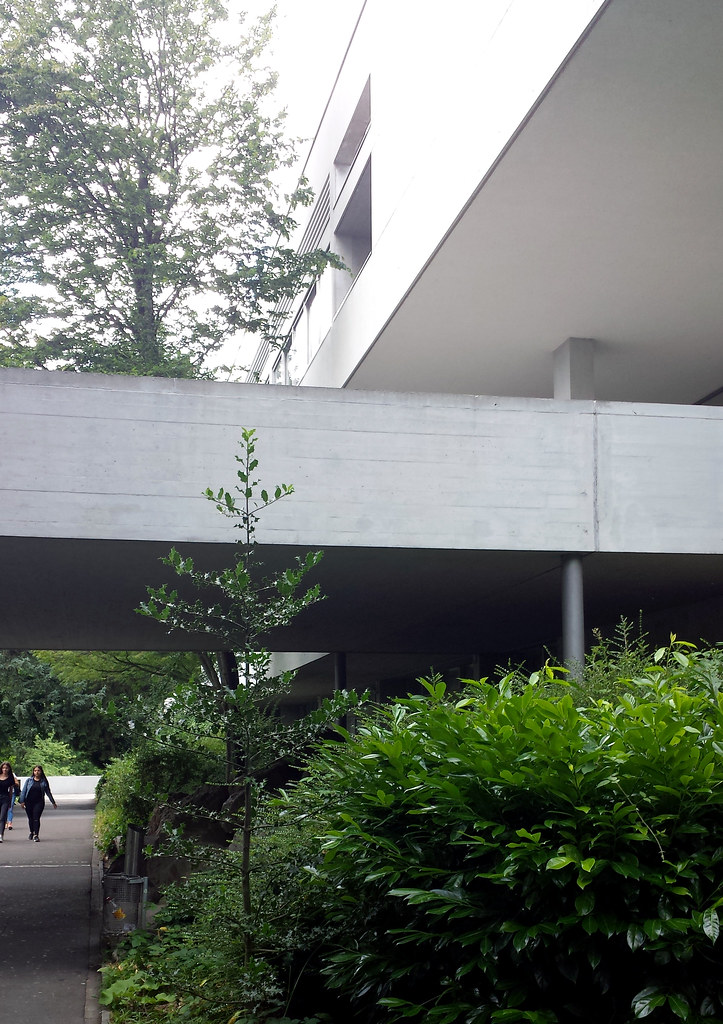
One of the most dramatic aspects of the design – the one that made me want to visit the school after seeing a photo of it – is the ramp that crosses the perimeter walkway and the rough landscape.
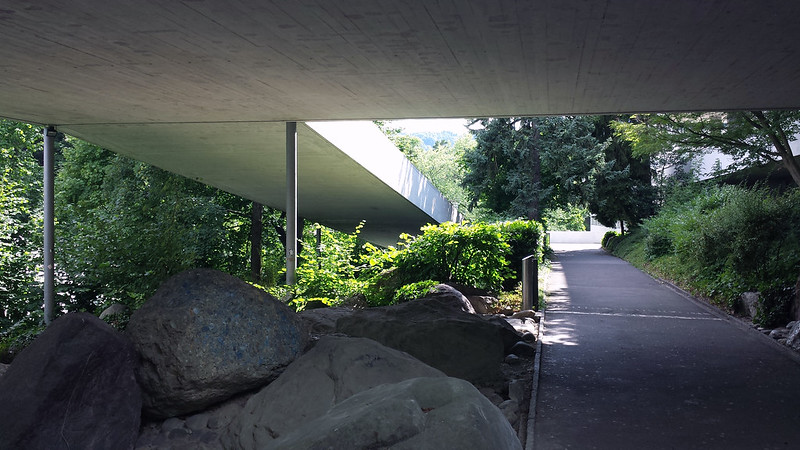
Rather than traversing the ramp, I walked up some stairs along the eastern edge of the school. The steps culminate in a raised plinth on top of the Gymnasium (3). From here, one sees the two main school buildings – Freudenberg (1) in the foreground and Enge (2) in the distance – that pop above the plinth.
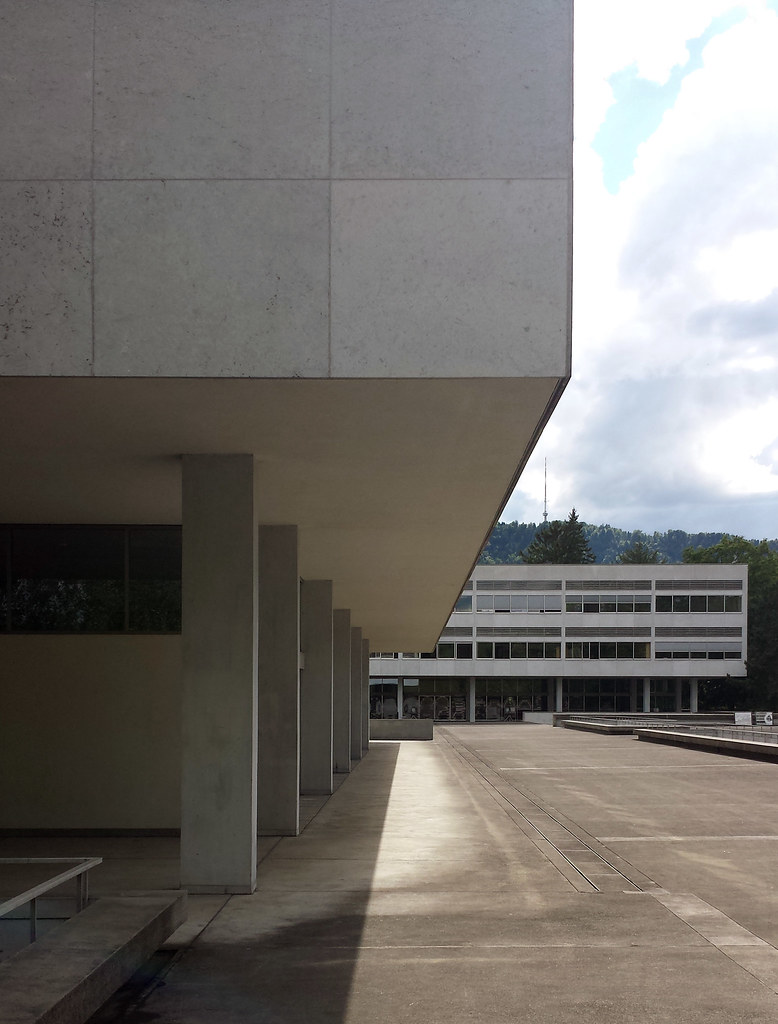
The slots visible in the aerial at the Gymnasium (3) are wells that bring light to the spaces within the substantial two-story plinth.
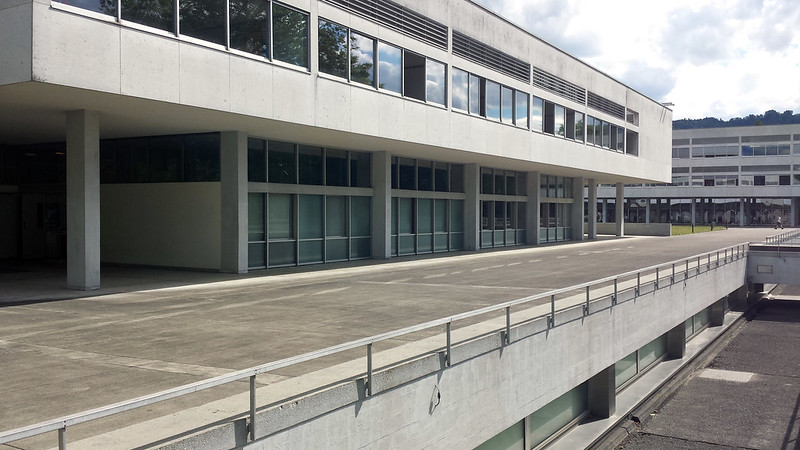
Taking a few steps westward, toward Enge (2), reveals one of the few views where a "building" can be seen in its entirety. From this northeast angle, Freudenberg (1) is a capable but none-too-exciting building. That's fine, since the appeal of the overall project is in how the rectilinear pieces create an artificial landscape that manages to insert itself so well into the site's terrain and landscaping.
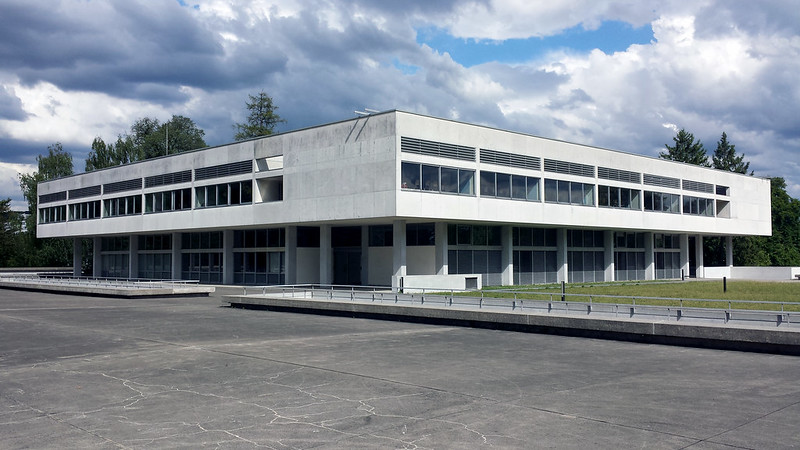
On axis between Enge (2) and the Auditorium (4) is a monumental stair that provides access to the plinth from the north. Here is the stair looking toward Freudenberg (1).
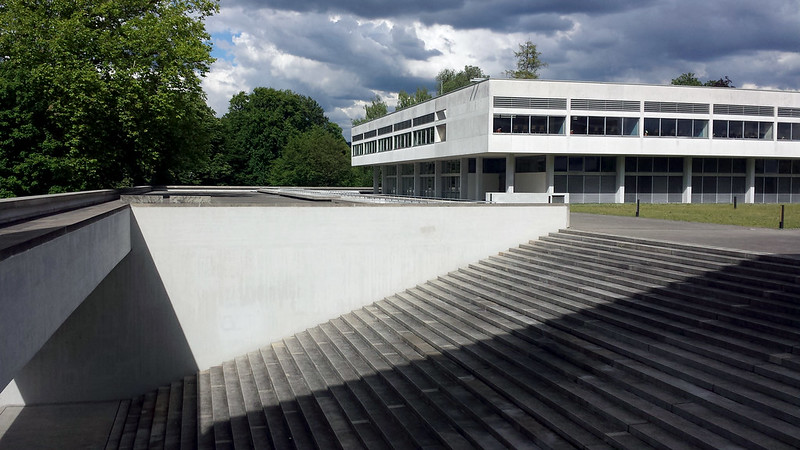
The view up the stair, with the walkway traversing it, is much like the ramp at the project's southeast corner.
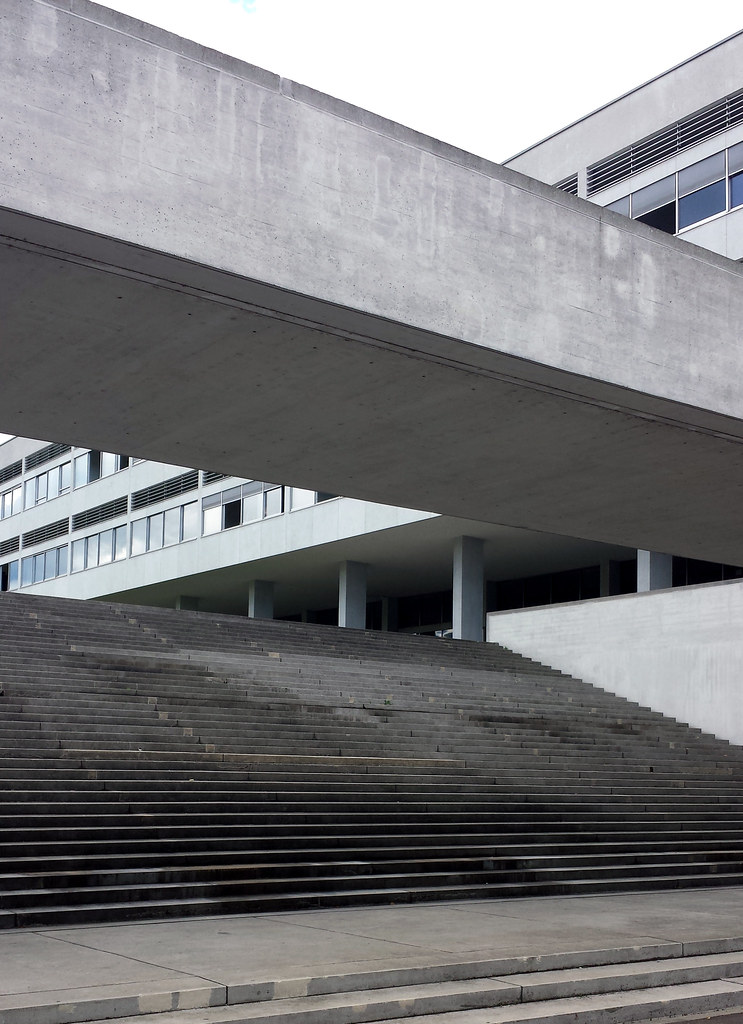
Just north of the plinth is the Auditorium (4), which has its own stepped forecourt.
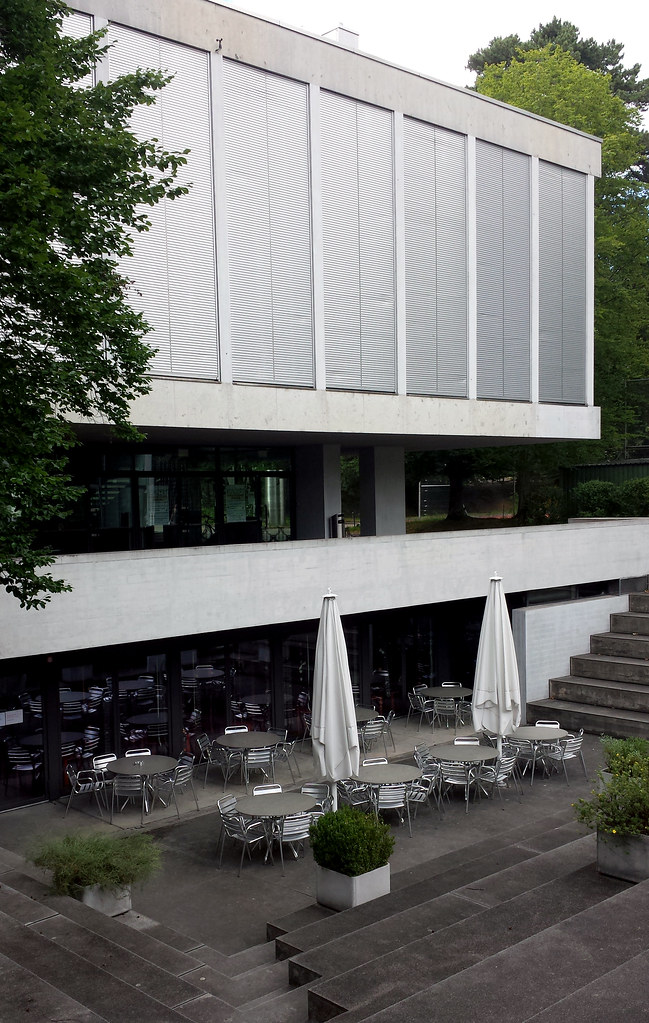
I walked past the Auditorium (4) to check out the Gymnasium (3), which overlooks the playing field with a wall of glass blocks. I visited on a Friday afternoon, figuring the school would be closed over the weekend. Although very few students or teachers were around, I was able to basically walk around and go inside some of the buildings as I pleased.
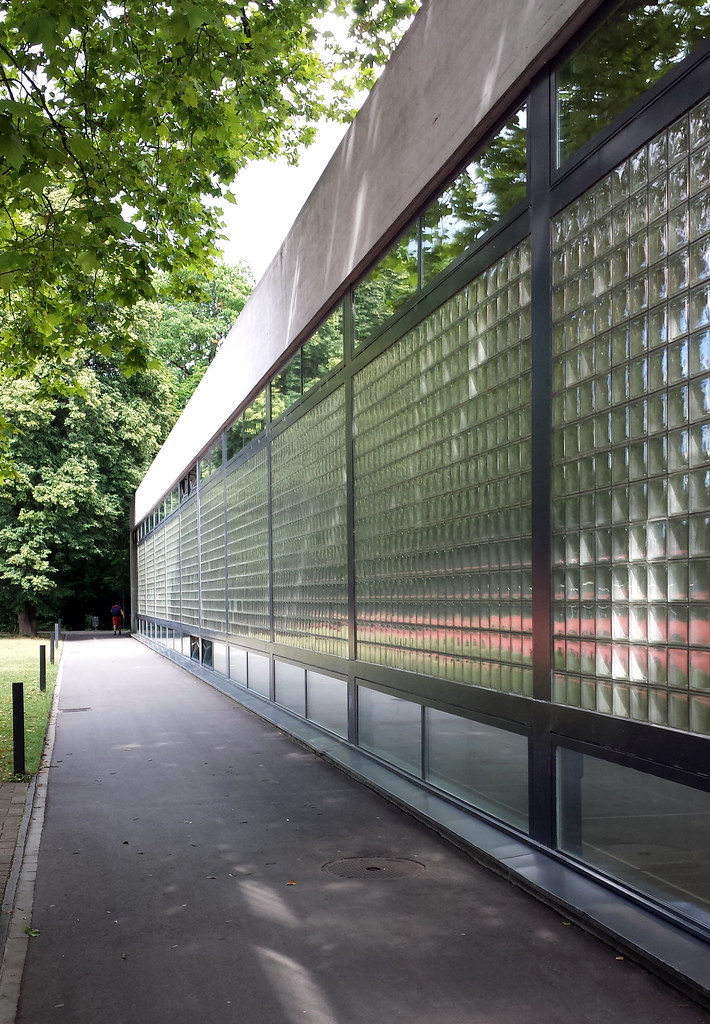
The corridor inside the Gymnasium seems low, but that is because it is beneath the well from the plinth above. The short windows in the well bring natural light to the taller spaces to the right of the corridor (behind the frosted glass walls)...
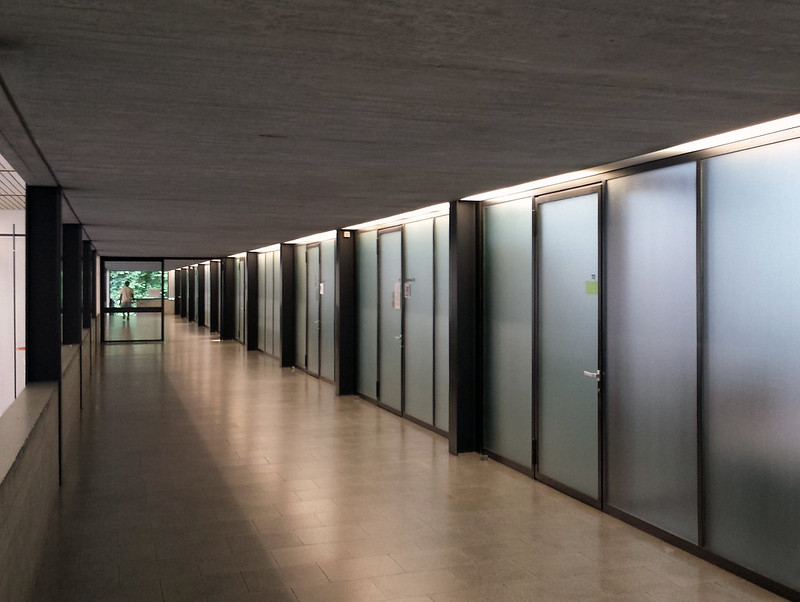
...and the double-height gymnasium to the left of the corridor.
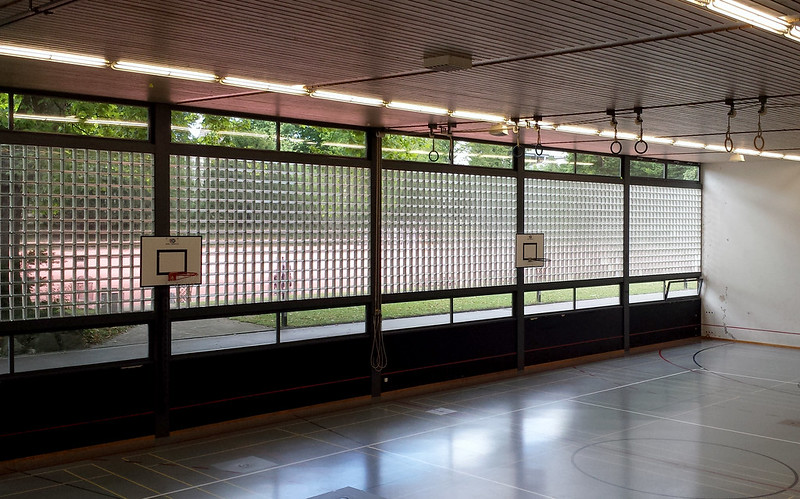
Heading back outside from where I entered, I walked toward the monumental stairs but opted to head back up to the plinth via a set of perpendicular steps visible here to the right.
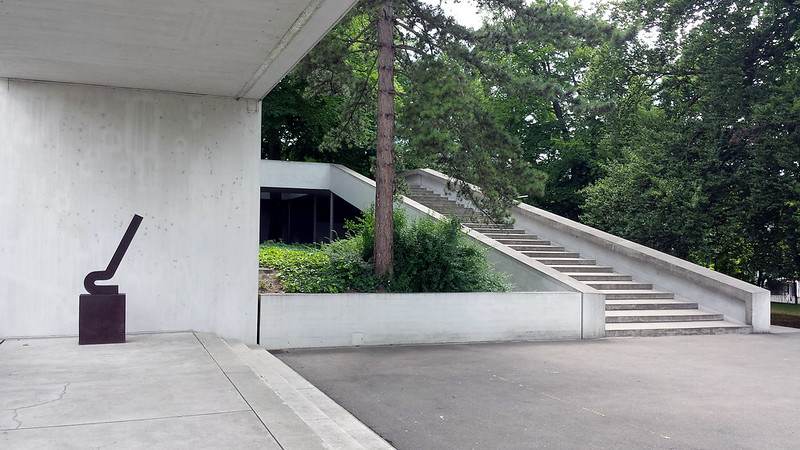
From these steps is a striking vista through Enge (2) toward Freudenberg (1).
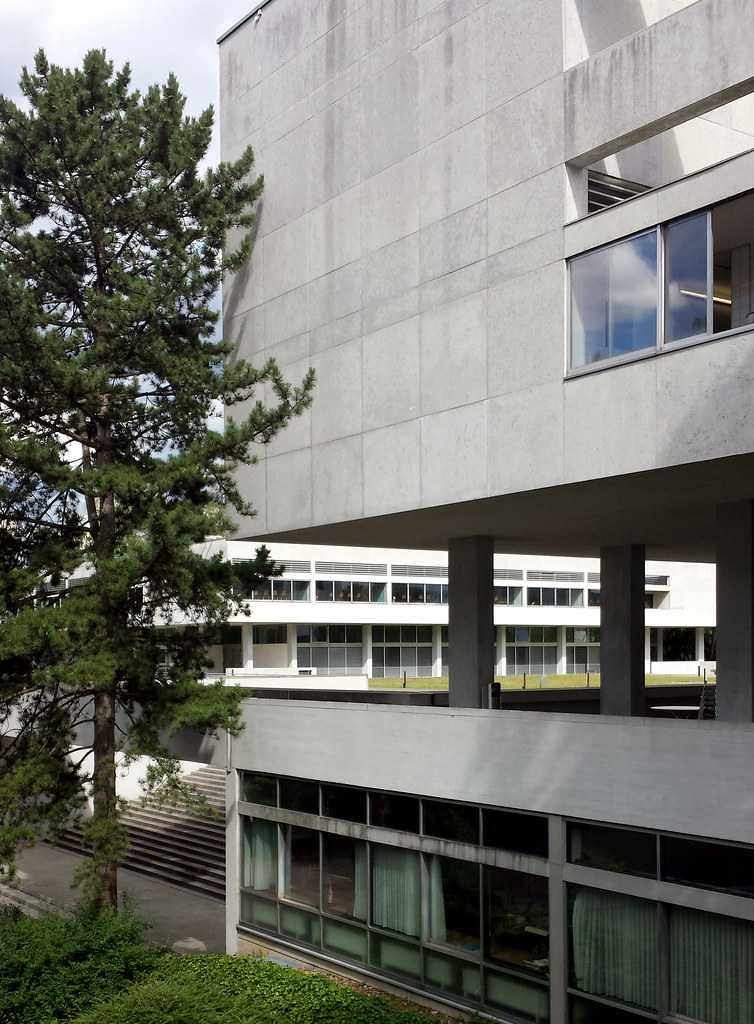
Back up at the plinth I stepped inside Enge (2) and came upon an unexpected triple-height atrium (not a great photo, but the best I could do with my smartphone).
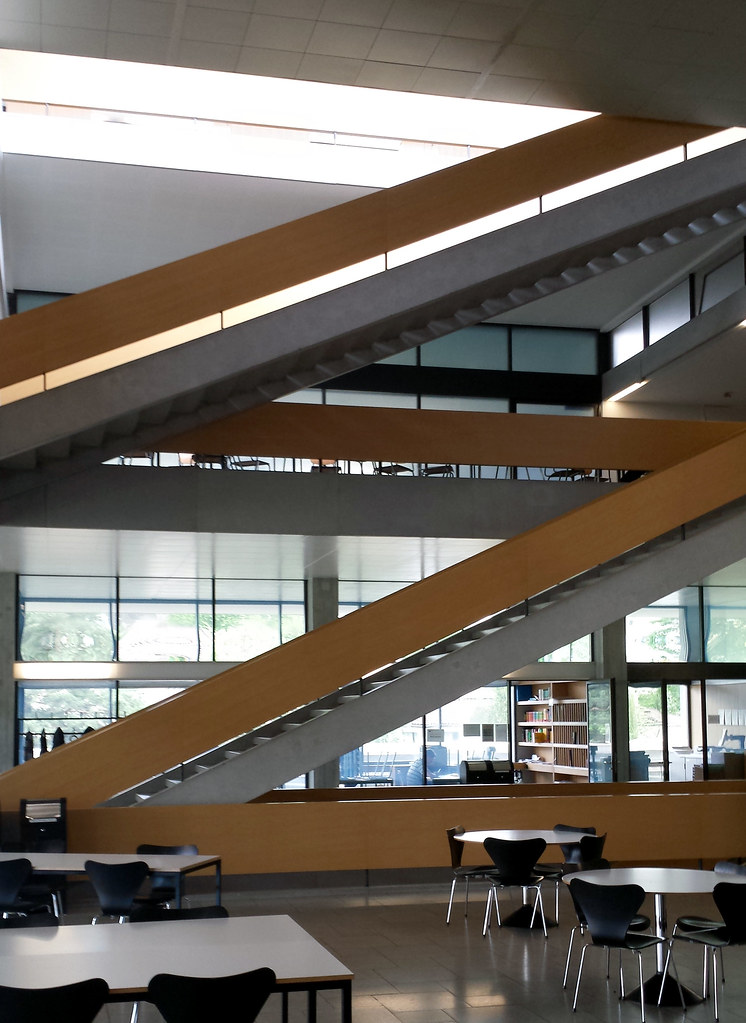
To the south of Enge (2) in the plinth is Natural Sciences (5), which has the same light wells as the Gymnasium.
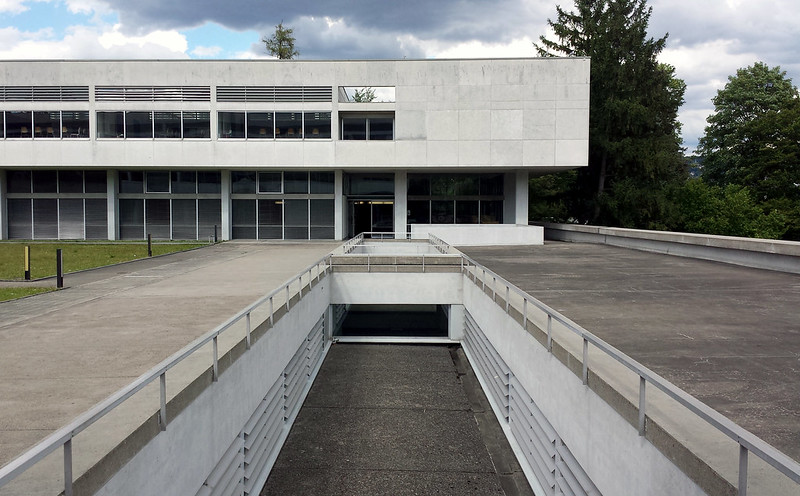
The west edge of Enge (2) has the last means of accessing the plinth, a large stair that descends to the southwest corner of the site.
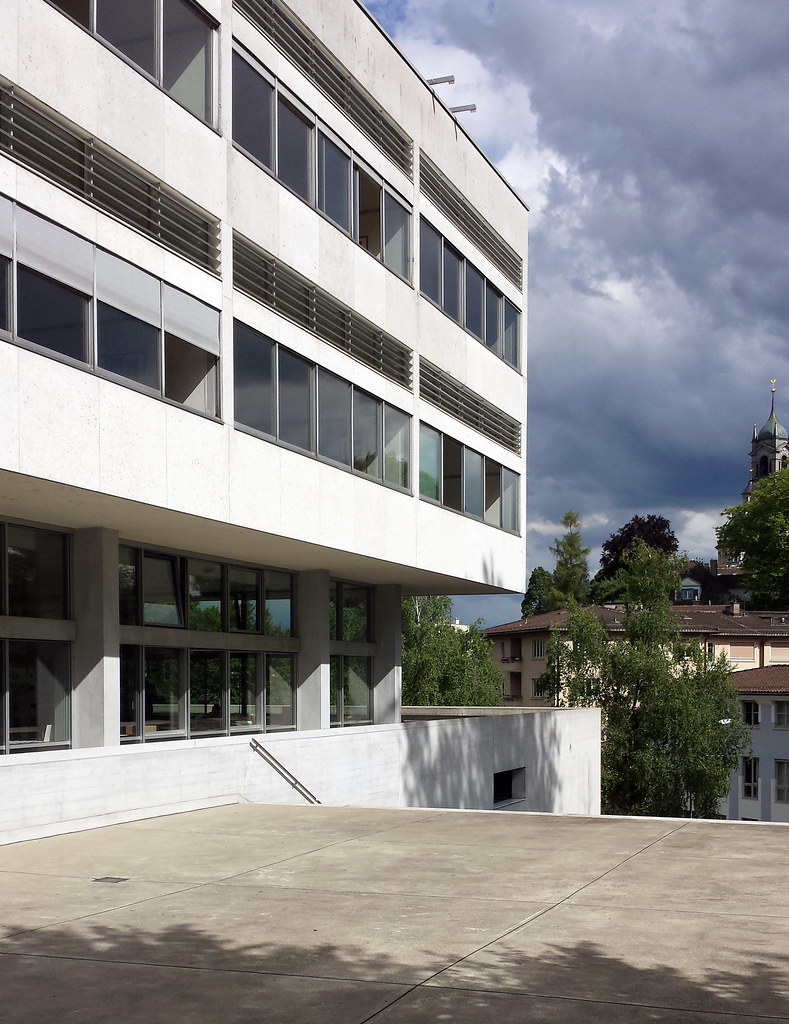
Seen from the base, the stair is an imposing one, given the slope of the site and the need to ascend even more steps to reach the plinth.
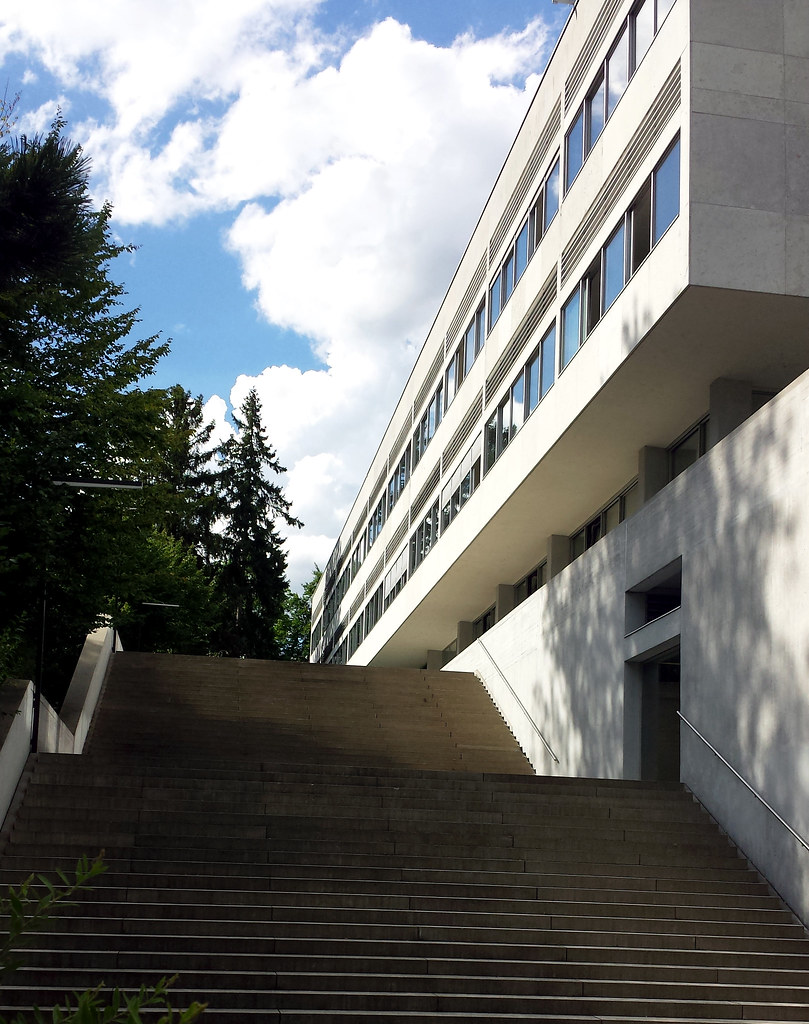
This photo shows the south facade of Natural Sciences (5), which has its own light wells for a lower level beneath the plinth's two stories.
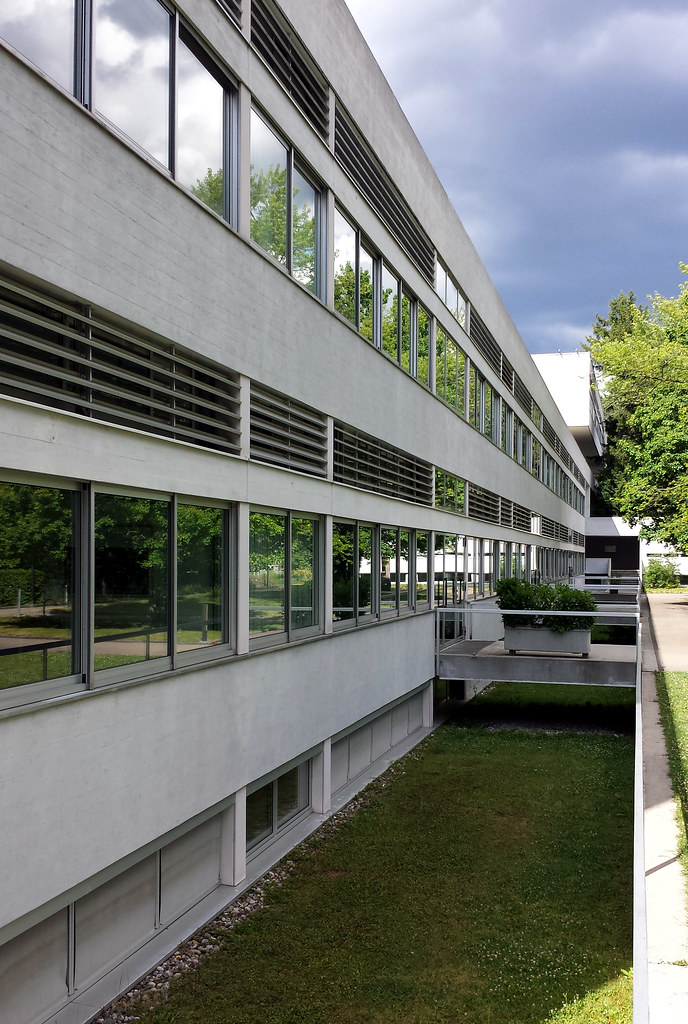
This counterclockwise tour around Kantonsschule Freudenberg brings us back to the southeast corner, here seen from the other side of the ramp and bridge. Needless to say, I was impressed with the building and recommend that people visiting Zurich go see it in person.

The next installment of "What I Did on My Summer Vacation" will present one of the buildings I visited in Missouri earlier this month.

Key:
1-Kantonsschule Freudenberg
2-Kantonsschule Enge
3-Gymnasium
4-Auditorium
5-Natural Sciences
6-Plaza
7-Tram Stop
My approach to the school was from the tram stop to the southeast (7), via some paths and stairs up the hill. At the southeast corner of the school, the building is simultaneously built into and propped above the landscape.

One of the most dramatic aspects of the design – the one that made me want to visit the school after seeing a photo of it – is the ramp that crosses the perimeter walkway and the rough landscape.

Rather than traversing the ramp, I walked up some stairs along the eastern edge of the school. The steps culminate in a raised plinth on top of the Gymnasium (3). From here, one sees the two main school buildings – Freudenberg (1) in the foreground and Enge (2) in the distance – that pop above the plinth.

The slots visible in the aerial at the Gymnasium (3) are wells that bring light to the spaces within the substantial two-story plinth.

Taking a few steps westward, toward Enge (2), reveals one of the few views where a "building" can be seen in its entirety. From this northeast angle, Freudenberg (1) is a capable but none-too-exciting building. That's fine, since the appeal of the overall project is in how the rectilinear pieces create an artificial landscape that manages to insert itself so well into the site's terrain and landscaping.

On axis between Enge (2) and the Auditorium (4) is a monumental stair that provides access to the plinth from the north. Here is the stair looking toward Freudenberg (1).

The view up the stair, with the walkway traversing it, is much like the ramp at the project's southeast corner.

Just north of the plinth is the Auditorium (4), which has its own stepped forecourt.

I walked past the Auditorium (4) to check out the Gymnasium (3), which overlooks the playing field with a wall of glass blocks. I visited on a Friday afternoon, figuring the school would be closed over the weekend. Although very few students or teachers were around, I was able to basically walk around and go inside some of the buildings as I pleased.

The corridor inside the Gymnasium seems low, but that is because it is beneath the well from the plinth above. The short windows in the well bring natural light to the taller spaces to the right of the corridor (behind the frosted glass walls)...

...and the double-height gymnasium to the left of the corridor.

Heading back outside from where I entered, I walked toward the monumental stairs but opted to head back up to the plinth via a set of perpendicular steps visible here to the right.

From these steps is a striking vista through Enge (2) toward Freudenberg (1).

Back up at the plinth I stepped inside Enge (2) and came upon an unexpected triple-height atrium (not a great photo, but the best I could do with my smartphone).

To the south of Enge (2) in the plinth is Natural Sciences (5), which has the same light wells as the Gymnasium.

The west edge of Enge (2) has the last means of accessing the plinth, a large stair that descends to the southwest corner of the site.

Seen from the base, the stair is an imposing one, given the slope of the site and the need to ascend even more steps to reach the plinth.

This photo shows the south facade of Natural Sciences (5), which has its own light wells for a lower level beneath the plinth's two stories.

This counterclockwise tour around Kantonsschule Freudenberg brings us back to the southeast corner, here seen from the other side of the ramp and bridge. Needless to say, I was impressed with the building and recommend that people visiting Zurich go see it in person.

The next installment of "What I Did on My Summer Vacation" will present one of the buildings I visited in Missouri earlier this month.
I really enjoyed your presentation about the school in Zurich as it depicted clearly the architectural heritage of Switzerland.
ReplyDeleteStrangely the strict/austere line of the building and its functional choices brought to my mind Ioannis Despotopoulos, a greek pioneer bauhaus architect that designed the Athens Conservatory (a brilliant architect if you ask me but barely recognised globally)
Ok, it is obvious that in your case we are talking about a building of everyday use with limited monumental character, therefore it may seem strange any comparison to the conservatory. Though the similarities on the use of public space in the common field of education may be a solid ground in order to evaluate the way of thinking of this movement that influenced architects from different national backgrounds.
Have a look if you wish to the homepage of the Athenian Conservatory
http://www.athensconservatoire.gr/%cf%89%ce%b4%ce%b5%ce%b9%ce%bf%ce%bd-%ce%b1%ce%b8%ce%b7%ce%bd%cf%89%ce%bd/get-know-athens-conservatoire/
I'm not an architect but since I ve studied culture I find this faculty/field of art amazing.
http://phen375greece.com/